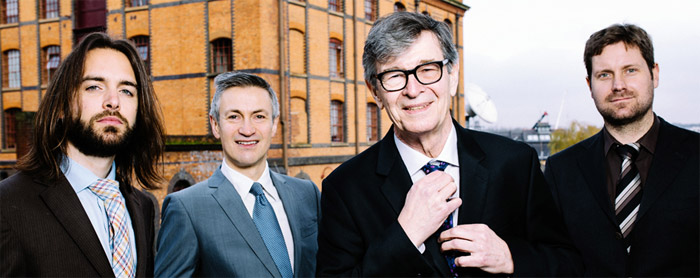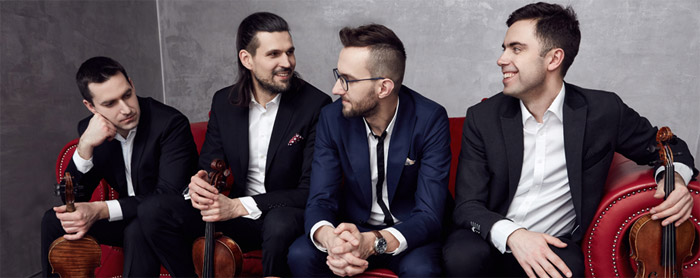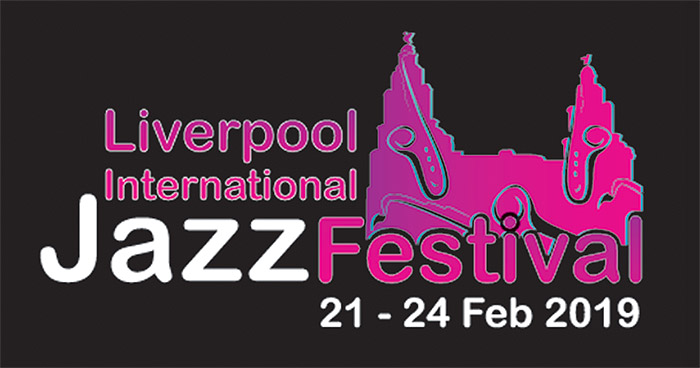Capstone Theatre, Liverpool
21st – 24th February 2019
Reviewed by Joe Coventry
Now in it’s seventh year the Festival promised to build on its reputation for bringing worldwide acts to the premier arts venue in the city. This year Jazz North West co-hosted the event with Capstone Artistic Director Neil Campbell.
The attendance on the opening night could have been better but there was a problem with the trains. Slow Loris from Leeds had the honour of starting the evening with a short set of hip hop and prog rock. They were followed by Austrian trio David Helbock’s Random/Control, the pianist ably supported by Johannes Bar with his esoteric range of instruments from tuba through to didgeridoo and Andreas Broger on woodwind.
Typical was a racy piano intro to some melancholic clarinet and baritone sax, Bar’s trumpet then capturing the mood before an ethereal wind down. The eclectic mix continued with vibrato sax and the piano in the deep end with horn and tabla.
The driving virtuosic beat did not compromise on innovative extrapolation; honks from a phallic red plastic thing deputising as an alpine horn before random cow bell and shaker percussion, juggled when not finessing inside the piano, to dark chocolate cloying noises from sax and horn and farty didgeridoo, over Dave Brubeck’s Take Five.
My Song had African Market overtones, plump piano noises and baritone sax displaying economy and assurance before stool assisted, foot manipulated, amp add on’s from Helbock. How did Beethoven’s 7th Symphony 2nd movement get in the mix? Bar’s trumpet led to tight interplay on that.
Day two started with an electro jazz combo from Lancaster, Kellega. Enhanced organic synthethiser and guitar loops from them. After the break Dan Nicholls, (keys) fronted the Strobes. He was the driving force behind the trio which also included Matt Calvert (guitars and synths’) and Dave Smith(drums). Billed as alt-rock the band had a veritable electronic workshop on stage. For me it proved to be an extrapolation to far – a repressive noise, maniacally driven and overly aggressive, led from the keys.
In later discussion over a drink an alternative view said that the set was a technical multi-layered affair but from where I was sitting it was like Steerpike knocking on the gates of Gormenghast. Early dart from me then.
Saturday is always a busy day with an early lunchtime start and a challenging programme with Milap providing an opening concert of Afternoon Ragas. The stage was resplendent and the lighting fitting for the combination of Manish Pingle (mohan veena, a 20 string Indian slide guitar), Gurdain Rayatt (tabla) and Jack Jennings (Electric Guitar). Not the usual mix but it worked to great effect.
Manish, from Bangladesh, said he hardly got to play Afternoon Ragas in real time. For Jack from Bristol it was a first time collaboration, his electric guitar producing evocative Armenian duduk-like reverberations to complement both Gurdain’s tabla and the maestro’s 16 beat rhythmic cycle led dexterity. It caught the audience out until they had digested the curry lunch on offer beforehand.
There was little respite before the action transferred from the new auditorium to the Great Hall. The duo of Kit Downes (piano) and Tom Challenger (sax) played to a committed 20 to 30 fans in the late afternoon double header, which also featured on similar instruments, the outrageous Stephen Grew and not far behind Trevor Watts.
Ethereal piano from Downes, more expansive sax from Challenger, but the acoustics of the room did not help and a flickering light did not assist the touchy feely comfort zone contributions transcendent as they were.
That could not be said of the next combo, where random association was given full reign in a Sturm und Drang cachophonous journey to hell by both players. Every part of the piano was fair game for Watts as he used the keys as an afterthought. Grew’s performance was a symbiotic masterpiece of free jazz; a maelstrom of primordial atonality of stentorian proportions produced to lung bursting effect. Chance the pairs latest CD – if you dare.

Darius Brubeck‘s Quartet headlined in the evening. It was all good straight laced stuff in the tradition of his dad, whose Blue Rondo a la Turk and of course Take Five made it into the set, in updated remakes from junior. The American pianist likes to tell stories in between letting Dave O’Higgins (saxes), Matt Ridley (bass) and Wesley Gibbens (drums) have a democratic tilt at the music which included amongst his own compositions Strange Meadow Lark, a piano ballad and the homely Kathy’s Waltz. It was easy going stuff and was well received by a laid back crowd.
Sunday commenced early with a trio of Northern bands plying their trade to a reasonable crowd. First up Liverpool-based After The Flood led by Neil Campbell. They imagine a blighted world populated by a few survivors trying to keep music alive. The set was a cross-continental drift of up beat folk and ethnic oriented feel good tunes which would not be out of place on a popular wildlife travelogue on TV.
Intriguingly, one of the tunes off the new CD is called 5-HTP, otherwise known as Serotonin, a precursor to wellbeing secreted in the brain. As the numbers lolloped joyfully along, so infectious foot tapping enjoined the journey. All the five man band got a go but the most interesting instrument in the mix had to go to Roger Gardiner’s Overwater bass but the lead guitarist’s enthusiasm and effort carried the day.
Deep Cabaret on next were not about happiness stakes. The eclectic sextet from Morecambe dealt in murkier waters; rejigging factual tales of global warming (extracts from Mary Oliver’s poem Wild Geese); a shipwreck in Morcambe Bay; Sambu, a newspaper report of an unrepresented slave. Often to dirge-like musical accompaniment from the bagpipe and hurdy-gurdy interventions from Paul Sherwood to outrageous freestyle voice overlay from Steve Lewis it was not easy on the ear or meant to be. A piece referencing Kandinsky’s abstraction in painting was the nearest it got to the musical norm for a well complemented group with guitar and cello inputs. Unnerving at times but compulsive listening.
Time for a break, so sadly no Ancient Infinity Orchestra.

To The Great Hall again for what turned out to be the gig of the festival before a minimalist crowd of about 30 from the Polish Atom String Quartet. Darius Brubeck had hinted last night that having been on the same bill as them recently in Warsaw that they were unmissable and so it proved. A stellar performance of brilliant virtuosity came courtesy of the violins of David Lubovitch and Mateusz Smoczynski, with Michal Zaborkski on viola and Krzsztof Lenczowski cello. The classical repertoire for jazz quartet is not naturally extensive but try telling that to these guys.
Impeccably turned out with great stage presence they ventured on a programme of selection of national composers like Paderewski or Penderecki (Impovisation No3) inputting their own zest, verve and assurance; there was also the Lamentation In Song for Christopher, a slow dirge for anguished violins questioning why?
Or a lighter folk inspired romp echoing the exploits of Stephane Grappelli and Django Reinhart. The emotional outpouring earned a well deserved standing ovation from those lucky to be present.
In the evening the Swiss trio Vein, supplemented by saxophonist Andy Sheppard, brought the festival to its conclusion. There appeared to be a problem with the reed on Sheppard’s instrument. That was compensated for by Michael Arbenz on piano, Thomas Lahms, bass, and Florian Arbenz, drums, concentrating on covering their new CD of Ravel inspired compositions like Le Tombeau de Couperin with a bit of Duke Ellington thrown in. They were a nice tight combo but their soulful mix missed some of the extra fizz that the ailing sax may have provided.
